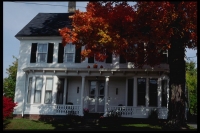閱讀邁剋爾·布洛剋 Michael Bullock在诗海的作品!!! | |||
邁剋爾·布洛剋(Michael Bullock, 1916-2008),生於英國倫敦,早年就讀於英格蘭巴金罕什爾的斯托學校,1936年參加倫敦超現實主義展覽,1938年出版其處女詩集《變形錄》,後來創辦了詩刊《表達》,成為歐洲現代主義詩歌的一個陣地。1969年移居加拿大,先後在幾所大學任教,1983年以加拿大不列顛哥倫比亞大學終身教授的身份退休。
布洛剋迄今已出版了二十五捲詩集,主要有《野性的黑暗》(1969)、《黑林中的綫條》(1981)、《雨之囚徒》(1983)、《暗水》(1987)、《帶墻的花園》(1992)、《迷宮》(1992)、《黑暗的玫瑰》(1994)、《在花朵中噴發》(1999)、《夜麯》(2000)等;此外還著有小說十餘捲、寓言兩捲、戲劇兩捲;翻譯過法、德、意等國的文學、哲學名著一百五十餘種。他還曾經與人合譯過我國唐代山水詩人王維等人的詩集《幽居的詩》和《毛澤東詩詞三十七首》。同時,他還是一位畫傢,多次舉辦過個人畫展。
布洛剋早年曾經受到象徵主義、表現主義、意象派的影響,但後來他逐漸轉嚮超現實主義,最終成為該流派的一個傑出人物。他認為,超現實主義“是人類精神中的一種特殊元素,凡是想象君臨之處必有超現實主義。”他的詩作具有潛意識、夢幻特徵,同時由於受到過中國和日本詩歌的影響而頗具東方藝術色彩,有道傢所謂的自然性和自發性。他的詩一般短小精悍,內涵和外延交織,既富於自然色彩又頗有形而上的哲學境界,係自然界物象與潛意識心象的結合體。
Michael Bullock is usually categorized as a surrealist, a designation he willingly accepts. In so far as much of his poetry and all his fiction is characterized by images drawn from the unconscious through the free flow of the imagination, the description is apt ( he has been described as "one of the most wildly imaginative minds ever to reach the printed page" - Wendy Jeffries, Hamilton Spectator ). However, his work is entirely coherent and finely wrought - the product of literary craftsmanship as well as an unfettered and fertile imagination - unlike most of what passes for surrealist writing. It can rarely be considered "automatic writing", though occasionally the author does employ this technique. As one critic puts it: "Talent and labour have produced these polished gnostic visions" (John Reid, Canadian Literature).
Many of his books have been translated into various European and Oriental languages, notably German, as well as Punjabi and Bengali and especially Chinese, into which language most of his works have been translated in whole or part. These translations have gained him international renown as a writer. His visual art is less widely known, since the international dissemination of works of art was less easy than it is today. Now, however, his visual art is quickly gaining the recognition it deserves.
A celebration of Michael Bullocks' life was held at the UBC Botanical Garden on Saturday August 16, 2008, at 2:30pm.
Michael Bullock, poet, painter, translator, and Professor of Creative Writing, University of British Columbia, died in London, England, on July 21, aged 90. His enthusiasm, affection and lively intellect and capacity for engagement with everyone he met will long live on across continents and especially in Vancouver, Hong Kong and the UK.
